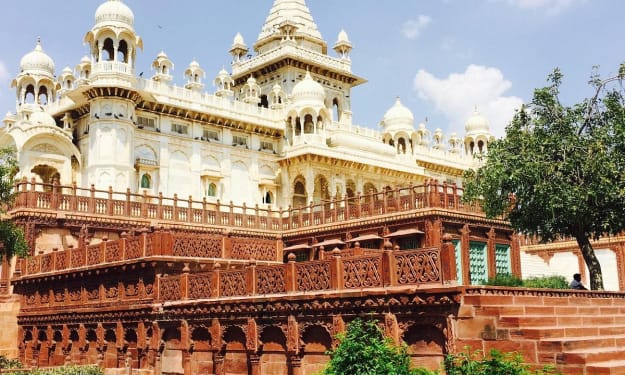Calico Museum of Textiles
Information about Calico Museum of Textiles Ahmedabad

The Calico Museum of Textiles in Ahmedabad, India, stands as a testament to the rich and diverse heritage of Indian textiles. Established in 1949, the museum is housed in the ancestral home of the Sarabhai family, a renowned industrialist family known for their patronage of arts and culture. With a focus on preserving and showcasing the evolution of Indian textiles, the Calico Museum has become a revered institution, attracting scholars, enthusiasts, and tourists from around the world. This essay aims to explore the historical significance, exquisite collections, architectural marvel, and the cultural impact of the Calico Museum of Textiles.
The museum's historical significance is deeply rooted in the rich tapestry of Indian textile history. Its establishment was led by the efforts of the Sarabhai family, with the vision of preserving India's textile traditions and craftsmanship. The museum is a tribute to the legacy of Indian textiles and the artisans who have contributed to its rich tapestry over the centuries. Since its inception, the museum has been instrumental in documenting and preserving textile artifacts, manuscripts, and artworks that narrate the compelling story of India's textile heritage.
The collections housed within the Calico Museum of Textiles are nothing short of magnificent. Spanning centuries, the museum's exhibits encompass a diverse range of textiles, including rare and ancient fabrics, embroideries, costumes, and artifacts from various regions of India. The museum's collection of court textiles, including Mughal, regional, and Pichvai textiles, is renowned for its exquisite craftsmanship and historical significance. Additionally, the museum also boasts an impressive repertoire of religious textiles, including temple hangings, narrative cloths, and ceremonial textiles, shedding light on the spiritual and cultural facets of Indian society.
From a historical and anthropological perspective, the Calico Museum offers a unique lens through which to understand the evolution of Indian textiles and the multicultural influences that have shaped the craft. The exhibits provide valuable insights into the techniques, motifs, and regional variations of Indian textiles, reflecting the social, economic, and cultural contexts in which they emerged. Furthermore, the museum's collection of historical manuscripts, dyeing and weaving tools, and textile-related artifacts serves as a valuable resource for researchers and scholars studying Indian textiles and their cultural significance.
In addition to its extraordinary textile collections, the Calico Museum's architectural marvel is a sight to behold. The museum complex is an amalgamation of traditional Gujarati architecture and modern conservation standards, seamlessly blending historical charm with contemporary functionality. The intricate woodwork, ornate carvings, and expansive courtyards create an ambiance of timeless elegance, offering visitors a peaceful retreat as they immerse themselves in the world of textiles. The museum's layout and design provide a fitting backdrop for the opulent displays, enhancing the overall sensory experience for visitors.
Culturally, the Calico Museum of Textiles serves as a custodian of India's textile heritage and a platform for promoting an understanding and appreciation of traditional textiles. It plays a pivotal role in fostering awareness about the historical, artistic, and technical aspects of Indian textiles, thereby contributing to the preservation and propagation of this invaluable cultural legacy. The museum's outreach programs, workshops, and exhibitions further enrich the cultural landscape by engaging with local communities, scholars, and artists, thereby ensuring that the legacy of Indian textiles continues to thrive and evolve.
The impact of the Calico Museum extends beyond its walls, influencing the global perception of Indian textiles and craftsmanship. Its role in promoting cultural exchange and fostering collaborations with international institutions has positioned it as a global ambassador for Indian textile heritage. Visitors from around the world are captivated by the museum's collections, leaving with a deeper appreciation for the artistic ingenuity and cultural significance of Indian textiles.
In conclusion, the Calico Museum of Textiles stands as a venerable institution that celebrates the timeless artistry, cultural significance, and historical legacy of Indian textiles. Through its rich collections, architectural splendor, and cultural impact, the museum serves as a custodian of India's textile heritage, weaving a narrative that resonates with the past, present, and future. As visitors continue to be enthralled by its treasures, the Calico Museum of Textiles will undoubtedly remain a revered beacon of India's textile heritage for generations to come.
If you are looking for a trip to Ahmedabad then,I recommend you the best cab service in Jaisalmer named as Jaisalmer Taxi Service Cab. Jaisalmer Taxi Service Cab is one of India's generally trustworthy, practical, and excellent taxi administrations. They offer minimal expense, great taxi benefits that ensure a charming excursion.





Comments
There are no comments for this story
Be the first to respond and start the conversation.